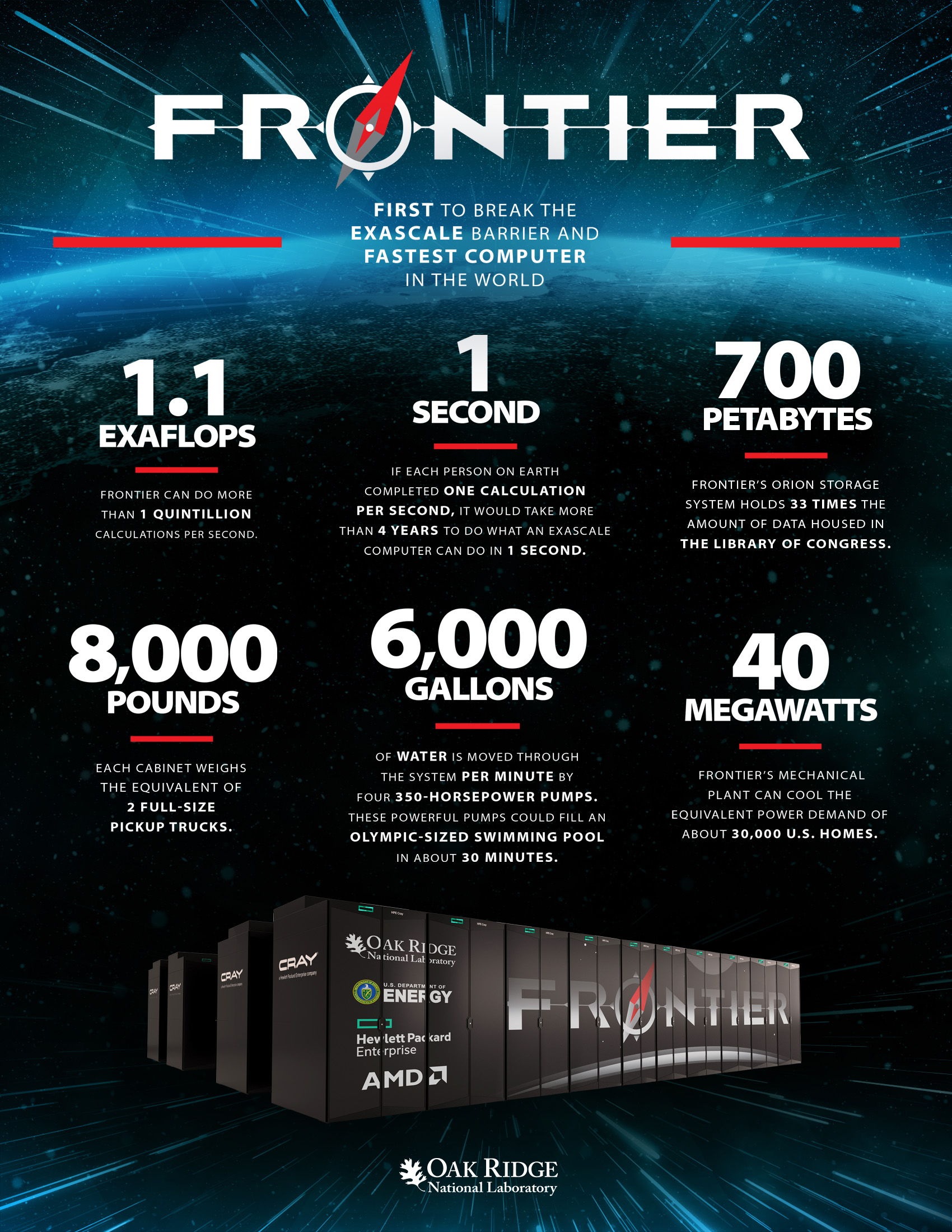Frontier Supercomputer Breaks Exascale Barrier

Frontier supercomputer at Oak Ridge National Laboratory (Photo: Oak Ridge National Laboratory and Hewlett Packard Enterprise)
The world’s first and fastest supercomputer, Frontier, built by HPE for the U.S. Department of Energy’s Oak Ridge National Laboratory (ORNL), has reached 1.1 exaflops, breaking the exascale speed barrier (a threshold of a quintillion calculations per second), and ranking number one on the Top500 list of world’s most powerful supercomputers. Notably, it is also ranked number one as the world’s most energy-efficient supercomputer, on the Green500 list, which rates energy use and efficiency by commercially available supercomputing systems, with Frontier delivering 62.68 gigaflops performance per watt.
Frontier features a theoretical peak performance of 2 exaflops, or two quintillion calculations per second, making it ten times more powerful than ORNL’s Summit system. It consists of 74 HPE Cray EX supercomputer cabinets, which include more than 9,400 AMD-powered nodes and 90 miles of networking cables. Each node contains one optimized EPYC™ processor and four AMD Instinct™ accelerators, for a total of more than 9,400 CPUs and more than 37,000 GPUs in the entire system. Check Figure 1 for other fun facts about Frontier.
E3SM project, as well as the closely related E3SM-MMF project, have been engaged in extensive exascale readiness and co-design activities with the E3SM model over the past several years and are well positioned to make use of Frontier as soon as it is available to applications. E3SM’s global storm resolving model SCREAM is expected to obtain record-setting performance on Frontier, enabling first-of-their-kind multi-year simulations at 3 km resolution, where deep convection is starting to be explicitly resolved rather than parameterized.
E3SM was mentioned by the DOE Office of Science Director Asmeret Berhe at the Frontier dedication ceremony.
“As a scientist who has been working in climate change for pretty much my whole career, I’m particularly excited to see how the Energy Exascale Earth System Model will be able to transform our understanding of several key earth system processes, and in particular, help us understand our changing climate with the urgency that’s needed,” said Berhe. “Climate modeling at exascale will deliver models at unprecedented levels of resolution, informing climate solutions that we will need at regional and national as well as global scales.”
— DOE Office of Science Director Asmeret Berhe
More details on Frontier can be found in recent news:
- DOE and ORNL Dedicate Frontier Supercomputer
- Frontier supercomputer debuts worlds fastest breaking exascale barrier | ORNL
- Hewlett Packard Enterprise Ushers in New Era with World’s First and Fastest Exascale Supercomputer “Frontier” for the U.S. Department of Energy’s Oak Ridge National Laboratory
- Frontier: Step By Step, Over Decades, To Exascale
- The Final Frontier: US Has Its First Exascale Supercomputer
- Frontier Named No. 1 Supercomputer on TOP500 List and ‘First True Exascale Machine’
This article is a part of the E3SM “Floating Points” Newsletter, to read the full Newsletter check:



